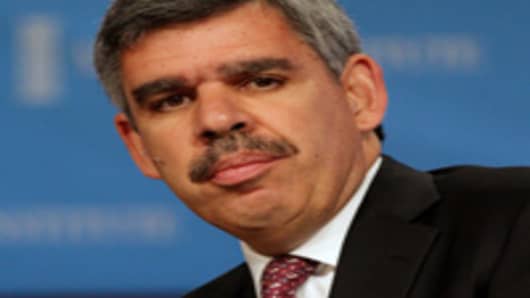Policy weakness in the US and Europe is prevailing over corporate strength to prevent a rally in the stock market, Pimco's Mohamed El-Erian said.
Speaking a day after the Dow industrials lost 500 points and fears intensified over another recession, the co-CEO of the world's largest bond manager said the tools are in place for a bounceback.
"If we lift this macro uncertainty there is potential for a significant market rally because of cash on the sidelines," El-Erian said in a CNBC interview. "Companies have the strongest balance sheets that I've seen for a very, very long time. And they have cash on that balance sheet. But...you need to lift the macro policy uncertainties in the US and in Europe."
Most recently Italy has replaced Greece as the primary focus of concern in the European periphery nations, which are beset by huge debts and a bailout plan that many believe will not be large enough to address bondholder concerns.
Closer to home in the US, a string of gloomy economic reports and a mediocre reading on jobsFriday rattled markets. That has been compounded by the debt battle in Washington which culminated in an agreement to raise the debt ceiling that left both sides unhappy.
"The key challenge is how to safely delever Western economies that became too dependent on credit and debt," El-Erian said. "You need growth. Unfortunately there are too many structural impediments to growth."
For investors, El-Erian recommended investors "not stampede into the bond market" because flight-to-safety buying has created "a lot of transient money."
He said the landscape will stay difficult until policy makers figure out a way to shed public debt and help fix the housing and jobs issues that are bedeviling the economy.
"We didn't solve the medium-term fiscal issues. In fact we made it worse," he said. "There are significant structural impediments. Until we see structural solutions out of Washington, (slow) growth will not allow us to delever fast enough."



